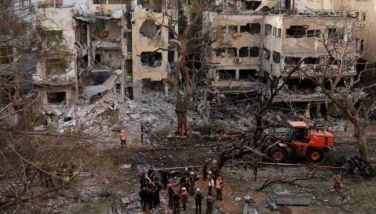EDITORIAL – Humanitarian crisis
March 28, 2003 | 12:00am
 Whatever the outcome of the war in Iraq, it is plain to see that a crisis is emerging – one so massive it will require an international response. You can see the crisis in the faces of Iraq’s Kurdish minority, who are fleeing both the coalition forces and Saddam Hussein’s troops. Not too long ago Saddam had gassed the Kurds to death; estimates of the death toll run to over a million. You can see the crisis in the faces of women, children and the elderly – the most vulnerable in times of conflict. You can see it even in the faces of able-bodied non-combatant men who could face arrest or harm on suspicion either that they are part of Saddam’s security forces or are aiding the coalition.
Whatever the outcome of the war in Iraq, it is plain to see that a crisis is emerging – one so massive it will require an international response. You can see the crisis in the faces of Iraq’s Kurdish minority, who are fleeing both the coalition forces and Saddam Hussein’s troops. Not too long ago Saddam had gassed the Kurds to death; estimates of the death toll run to over a million. You can see the crisis in the faces of women, children and the elderly – the most vulnerable in times of conflict. You can see it even in the faces of able-bodied non-combatant men who could face arrest or harm on suspicion either that they are part of Saddam’s security forces or are aiding the coalition.
With Saddam and his troops refusing to be shocked and awed by the combined might of the United States and Britain, the war in Iraq is turning ugly. In the age of high-tech stealth bombers and cruise missiles, Saddam has managed to draw the coalition forces into conventional and guerrilla warfare. He has made sure collateral damage from the coalition’s fire won’t be confined to the Chinese embassy.
Unable to match the coalition’s firepower, Saddam has used the most effective shield: his own people. Instead of getting civilians out of harm’s way, he has made sure his people would protect him – whether they like it or not. That spells disaster for the people of Iraq. US President George W. Bush has vowed that the "day of reckoning" for the regime of Saddam Hussein is drawing near. The way the war is unfolding, however, the day of reckoning may not be near enough for the Iraqi people.
United Nations Secretary General Kofi Annan has sounded an alarm for the humanitarian crisis now emerging in Iraq. It is a crisis that nations in the coalition, with their combined economic resources, may be able to address by themselves once the war is over. But it is a crisis that can be better met by the combined resources of the international community. The legitimacy of this war will be debated for a long time. No matter where nations stand in this war, however, the world must come to the aid of the people of Iraq.
BrandSpace Articles
<
>
- Latest
- Trending
Trending
Latest
Trending

By EYES WIDE OPEN | By Iris Gonzales | 5 hours ago

By BABE’S EYE VIEW FROM WASHINGTON D.C. | By Ambassador B. Romualdez | 5 hours ago

By A LAW EACH DAY (KEEPS TROUBLE AWAY) | By Jose C. Sison | 2 days ago
Latest
Recommended
























